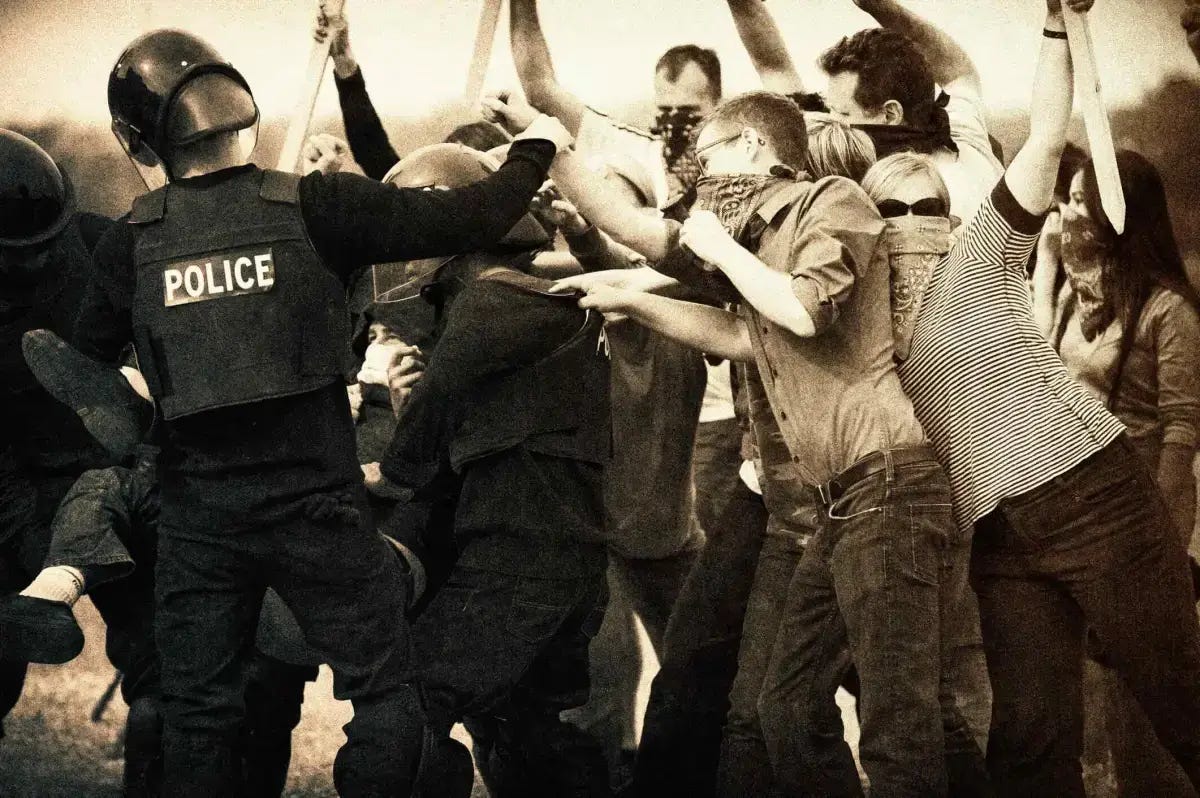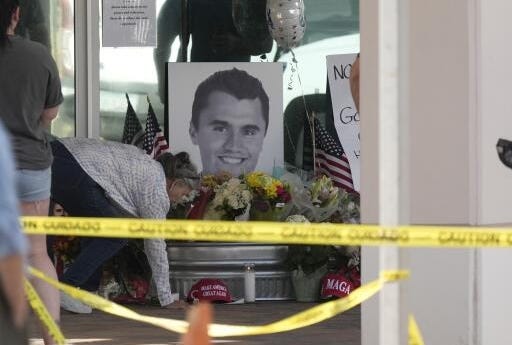Charlie Kirk & the normalization of political violence
President Trump’s ear was grazed by a bullet as he narrowly escaped with his life at a rally. He was targeted again soon after.
UnitedHealthcare CEO Brian Thompson was assassinated, with Luigi Mangione arrested for his murder.
A gunman killed two Embassy of Israel staff members who were leaving a “Young Diplomats Reception” at the Jewish Museum in Washington, D.C.
Pennsylvania Gov. Josh Shapiro’s mansion broken into and set on fire.
Tesla vehicles have been torched, and bullets as well as Molotov cocktails were aimed at the company’s showrooms.
Two Minnesota state lawmakers were shot in their homes.
In March, a fire was set to the entryway to the New Mexico Republican Party headquarters.
BB pellets and gunshots were fired at the front door and window of the Democratic National Committee office in Arizona on three separate occasions last fall.
Nancy Pelosi’s husband was bludgeoned with a hammer in his home; his attacker admitted he had planned to hold the speaker hostage to “end government corruption.”
Individuals, including some from extremist groups, stormed the U.S. Capitol to protest the 2020 presidential election results.
Eric Coomer, an executive at Dominion Voting Systems, was forced into hiding after his home address was published and a million-dollar bounty was put on his head.
And now, the successful assassination of political commentator Charlie Kirk.
This is not just a list of isolated incidents. It feels like an escalation of political violence — and studies back up that perception. But beyond the violence itself, what’s perhaps even more alarming is the growing justification and celebration of it — which may, in turn, fuel more violence.
It’s not so different from those who hailed Hamas as the “resistance” after October 7, when they murdered, tortured, and kidnapped civilians, including children. That too was framed as “righteous” action, justified by political grievances.
Yes, we all have different perspectives. One could argue — persuasively — that UnitedHealthcare is deeply corrupt and complicit in countless deaths, making Thompson culpable.
Those who saw October 7 as justified, point to the displacement of Palestinians and decades of Israeli policy.
Those cheering Kirk’s death see him as a misogynist, transphobe, and gun advocate — someone whose influence, in their eyes, made life worse for many. His assassination, they believe, is a net positive.
Those who are overjoyed by Kirk’s death believe him to be a negative force, advocating for policies that they strongly disagree with. Someone who is a misogynist, transphobe, and gun advocate—someone whose influence, in their eyes, made life worse for many. So his forceful removal, in their eyes, is a net positive.
But what kind of society do we become if we decide that disagreement warrants death? If we trade words for bullets?
Who decides who “deserves” to be punished — and for what?
Yes, there will always be unhinged individuals who turn to violence, whether inspired by political rhetoric or by the strange voices in their heads. But when violence normalized—and worse—applauded, that’s when our society has been infected by something rather sinister and we’ve crossed over to something so much darker.
In a functioning society, we meet arguments with arguments. We change bad laws through legal and democratic processes. We prosecute crimes in courts with due process, not by mob vengeance. When policies need changing, we have mechanisms through which this can be accomplished—legal and social.
Yes, sometimes violence signals that these systems are failing — that people feel powerless and unheard. But that does not justify abandoning the systems entirely. We must work to make them better.
Our legal framework is imperfect, but it is at least universal — it provides evidence, defense, and appeal. It is a hard-won safeguard against raw vengeance.
When we abandon that framework and decide, “This person deserves to die because I believe they are harmful,” we make ourselves judge, jury, and executioner. And if everyone has that right, we welcome in a very dark and dangerous world, because the person standing next to you might have a very different definition of who is “deserving” of death.
Today, it’s Charlie Kirk. Or an insurance CEO. Tomorrow, it could be a farmer who raises livestock (“meat is murder,” after all). A car manufacturer whose vehicles have high emissions. Or a professor who advocates for socialism.
Everyone has an opinion. Do we really want to live in a world where those opinions are enforced with bullets and bombs?
Justice should not be decided by whoever is angriest, or most willing to use violence.
When disagreement becomes grounds for assassination, we are no longer in a society that values pluralism, persuasion, and debate. We are in a society ruled by fear and force.
And do we really believe that the most violent among us are the wisest? That they should decide who lives and who dies? Is that whom we want in charge?
When you normalize the idea of political violence, and justifying murdering others because “we are right” and “this person is bad,” then inevitably your opponents will eventually feel justified to do the same. This cannot end well. It never does.
Political violence doesn’t just remove individuals from the conversation; it silences everyone who witnesses it. If you know that speaking out might get you killed, you self-censor. And today’s silenced voices may be those you agree with tomorrow. Or your own.
One can condemn Charlie Kirk’s rhetoric without condoning his murder. One can vehemently disagree with him, or others, while also defending their right to speak—and stay alive while doing so.
Our polarization is feeding a culture where disputes are no longer resolved through conversations, but through force—and bullets. In such a world, power belongs to those most willing to kill for it. And that is not justice. That is terror.
If you found this story useful, please consider supporting my work by sharing, becoming a paid subscriber, or making a one-off donation via Buy Me a Coffee ☕️.
Also, check out my book: No Apologies: How to Flind and Free your Voice in the Age of Outrage!





you need to post this on X too.
Back in 2012 I was debating my commie🤣 brother about what I see that society is headed to if we don't intervene. (I was debatibg the then rise of frequent language being used by the left.
I put it this way.
>"I don't like what you say"
>"I don't like what you say, you ideas are dangerous"
>"I don't like what you say, you are dangerous, we must stop you from speaking"
>"I don't like what you say, we must by force, stop you from speaking"
>"I don't like what you say, you are dangerous we must build camps herd you into those camps and kill all of you because you destructive to the greater good of the world.
We are now at the point where next step is the camps.
Mr. Thomas is correct, I was absolutely not surprised by this heinous act. Great article, Katharine and all too true. RIP Charlie Kirk (1993-2025)! May his memory be a blessing! I don’t care who it is, It could be someone who I vehemently disagree agree with, they have the right to free speech and the right not to be murdered for it even I really don’t like them. I didn’t care for Charlie Kirk at least as a political commentator. But I’d never celebrate his death. The normalization of political violence in this country is shocking and appalling and has been getting steadily worse over the past eight years. We are so close to civil war its frightening. The only time we were closer was 1860. Our republic is in its most difficult period since the Great Depression of the 1930s. We need to turn down the temperature on our political rhetoric and we need to start de-polarizing America and make serious strides at it in the next ten years or America will cease to be. I truly believe that in my heart. There will be no America in ten years if this keeps up. Red and Blue America will get a divorce and that’ll be the end of that. The war will start there with one side trying to impose their will on another. That can’t be aloud to happen we’ve got to save this Republic and restore it to its greatness.
Is this the America Nathan Hale he had regretted he had but one life to give for? Is this the America Dr. Joseph Warren and Casimir Pulaski gave their lives in battle for? Is this the America that Thomas Paine envisioned when he wrote Common Sense? Is this the America that is a shining city on a hill the Pilgrims dreamed of? Is this the America that the men who stormed the beaches of Normandy on D-Day put their lives on the line for? Is this the America Dr. Martin Luther King, Jr., Malcolm X and Medgar Evers died fighting to build a more prefect union for? Is this the America that Abraham Lincoln, James Garfield, William McKinley, and John F. Kennedy were assassinated while governing because they cared so deeply about it they devoted their lives to public service?
Those are questions we need to answer and fast if we want a better future for us and our children. How would George Washington, Thomas Jefferson and Abraham Lincoln feel about America if they were alive today? They’d be absolutely horrified! I can just see John Adams and Ben Franklin in Heaven right now weeping for America. I can see Jack and Bobby Kennedy cursing our generation for ruining the great country they worked so hard to serve. I can see Walt Disney, Jim Henson and Mr. Rogers shaking their heads and wondering why the lessons they sought to teach us are being ignored. I can see Dwight D. Eisenhower, George S. Patton, Douglas MacArthur, George C. Marshall, and Omar Bradley questioning whether their service really accomplished anything. I can see Sitting Bull, Fredrick Douglass, Cesar Chavez, Larry Itilong, and Susan B. Anthony decrying how identity politics and third and fourth-wave feminism are undoing all they worked for. I see Uncle Sam himself asking where he can get a refund for all the time and effort he waisted trying to represent our nation with pride when we have given him such a broken down old hunk of junk to represent.